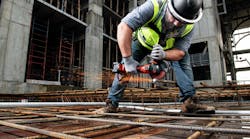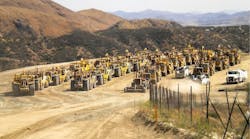The Economic Stimulus Act (ESA) of 2008 has helped motivate equipment purchasing around the country this year, but the housing downturn and other economic factors are causing many utility contractors to forego buying new machines, two leading construction industry trade associations reported today.
The results of a national survey of utility contractors released by the Associated Equipment Distributors (AED) and the National Utility Contractors Association (NUCA) strongly suggest that Congress and the president could give the economy and construction industry an immediate shot by increasing water infrastructure investment. The study also shows that extending the ESA's capital investment incentives would have a positive impact on equipment purchasing next year and demonstrates the direct impact that water infrastructure spending has on the equipment industry.
According the AED-NUCA report:
- The ESA's capital investment incentives have had a positive impact on utility contractor equipment purchasing. Approximately one-third of the survey respondents said that they had purchased equipment in the first half of 2008 to take advantage of the depreciation bonus (35 percent) and/or the increased Section 179 expensing levels (32 percent).
- The ESA will continue to have a positive impact on construction equipment purchasing activity through the end of 2008. Approximately one-quarter of respondents said they planned to purchase equipment in the second half of 2008 to take advantage of the depreciation bonus (27 percent) and/or increased Section 179 expensing levels (26 percent).
- Extending the depreciation bonus and increased Section 179 expensing levels through the end of 2009 would provide additional economic stimulus next year. More than three-quarters of survey respondents said that if the ESA's capital investment incentives were extended they would be more likely to buy additional equipment in 2009. Seventy-six percent said they would be more likely to buy equipment next year if the depreciation bonus was extended and 77 percent said the same about the increased Section 179 expensing levels.
- Utility contractors have been hit hard by the downturn in the housing market. Ninety percent of survey respondents said that the downturn in the housing market has had an impact on their companies, with 64 percent saying that the impact of the downturn has been "major". The housing downturn was cited as survey respondents as a major reason they had not bought equipment this year.
- Enacting legislation to increase federal investment in water infrastructure would (in addition to other economic, environmental, and public health benefits) have an immediate and positive impact on the economy and enhance the ESA's effectiveness. Seventy-one percent of survey respondents said they would be more likely to hire additional employees and/or add positions this year if Congress enacted legislation increasing federal investment in water infrastructure. Seventy-two percent said increased water infrastructure funding would make them more likely to buy equipment and take advantage of the depreciation bonus and/or higher Section 179 expensing levels this year.
- Water utility work is equipment-intensive and a significant portion of the average water project bid is attributable to equipment costs. Survey respondents report that, on average, when preparing a bid on a water utility project, at least 12 percent of the bid is attributable to the purchase, rental, and leasing of construction equipment, and to the cost of dealer-performed equipment repairs.
"While the ESA has clearly had some positive impact, this study also shows that contractors aren't going to buy equipment if there's no work to do, no matter what the incentives," NUCA CEO Bill Hillman said. "The housing downturn has taken a big toll on our members and we're hopeful that the housing stimulus bill recently approved by Congress will help. But it shouldn't end there. Boosting water infrastructure investment would have an immediate and positive impact on the economy, and extending the ESA would continue to provide stimulus next year."
"This report underscores the strong connection between water infrastructure investment and equipment purchasing," AED President Toby Mack said. "We now know that at least 12 cents of every dollar spent on sewer and drinking water projects makes its way into the hands of equipment distributors. If Congress and the president are looking for ways to enhance the ESA's effectiveness, infrastructure stimulus is the obvious answer."
The online survey was conducted from July 7 to 24, 2008. Seventy-eight utility contractors from all regions of the country participated, resulting in a margin of error is less than 11 percent.
The full survey report is available at https://www.aednews.com/aednuca/.


